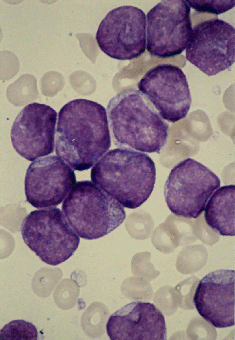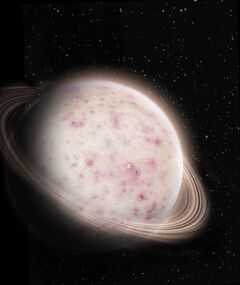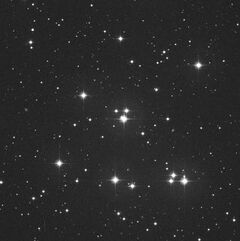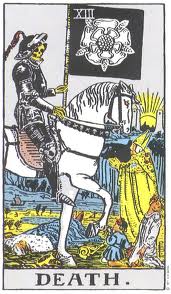Cancer (constellation)
“I was born under the sign of cancer, turns out I wasn't the only growth emerging from my mother's cervix...”
Cancer is one of the twelve constellations of the zodiac. It is the fourth astrological sign, lying between Gemini to the West and Leo to the East. The name comes from the Latin word for "malignant tumour" and it is commonly represented as such in art and folklore. Its glyph is ![]() , which symbolises the transformation of ordinary cells into abnormal ones.
, which symbolises the transformation of ordinary cells into abnormal ones.
The sign is no longer aligned with the constellation as a result of the precession of the equinoxes. As well as this, Cancer has displayed uncontrolled growth over the years, and has since gone on to "infect" many of the other star signs around it. Aries the Ram has been given six months at best, and Taurus' balls are now the size of galactic nuclei.
Cancer the constellation is unrelated to Cancer the crab, a malign form of crustacean that accounts for 13% of all deaths in human society.
Stars
55 Cancri is a quintuple planet system with four gas giants and one terrestrial planet. Unsurprisingly, there is no life on any of them. The system is simply too harsh and destructive to allow any kind of life to survive.
The following stars make up the constellation:
| Bayer designation | Name | Origin | Meaning |
|---|---|---|---|
| α | Acubens | Arabic | unusual lump |
| β | Al Tarf | Arabic | intense pain |
| γ | Asellus Borealis | Latin | coughing |
| δ | Nahn | Persian | lymph nodes |
| ε, M44 | Praesepe (or the beehive cluster) | Latin | jaundice |
| ζ | Tegmine | Greek | fear like you've never felt |
All of the stars that make up Cancer are fairly dim. In fact they are among the dimmest stars in the night sky. This had led to it being known as "the dark sign", so dim that you can barely tell it's there, and when you finally do it's often too late.
As noted, the stars of Cancer are rapidly expanding and multiplying, making it difficult to keep cartographical track of the zodiac. When Galileo Galilei drew his map of the night sky, there were only four stars in the constellation, there are now seven. Naturally astrologers are worried about the galaxy's future. Many of them have given up smoking as the escaping fumes only seem to exacerbate the problem. The fumes have also caused thick, black tar to form around the opening of several nearby black holes, which prior to this were a healthy pink colour. If Cancer spreads much further, it could cause the entire universe to become a horrid, unmappable mess. The charity Cancer Research was set up to try and stop this, and by donating just £1 per month you can prevent Cancer from spreading throughout the galaxy.
Representations
Many constellations were named for objects or animals they resembled, and Cancer is no different. While Taurus is said to look like a bull, and Virgo a beautiful woman, ancient astrologers thought that Cancer looked remarkably similar to a malignant neoplasm. In traditional art, it was commonly made to depict a bunch of cells, specifically those cells lacking tumour suppressing genes. The stars' hyperactive growth and division further affirmed this concept, thus it was named Cancer, after the Latin word for such a disease. Interestingly, Cancer is one of the few star signs to actually look like the thing it's named after (although Orion does kind of look like a man, if you squint and are drunk).
Mythology
The character of Cancer originates in Greek mythology, as do many of the zodiac signs. According to legend, Hera vowed to kill Heracles, the most famous Greek hero. She tried this in a number of different ways, but each time Heracles' great strength allowed him to survive.
During the battle between Heracles and the Hydra, the goddess sent Cancer to fight alongside the serpent. The disease got to work straight away, attacking Heracles' internal organs and making him feel all weak and lumpy. But Heracles was so strong that he emitted his own powerful radiation treatment, blasting the malignant cells up into the sky, where they formed the constellation of Cancer.
Another account is that the disease almost managed to defeat Heracles, but then Chemo, the Greek god of potions and cures, saved Heracles using months of debilitating clinical treatment that left him bald and barely able to produce his own blood cells. Following this he spent several years with Palliative, the Greek god of support groups, who battled the residual emotional trauma with the hero (in a fight to the death in the city arena, of course). Hera then placed Cancer in the sky to reward it for its services, but because it failed in its task its stars would never shine brightly.
Astrology
Under the tropical zodiac, the Sun enters Cancer on the moment of summer solstice by definition, or roughly on June 21, leaving it around July 21. Under the sidereal zodiac, it is currently roughly from July 16 to August 15. However, due to the relentless expansion of the constellation, there is hardly a time when the Sun isn't in Cancer. The combined forces of the two means that sunscreen should always be worn, whether indoors or out.
People born during the traditional zodiac dates are believed to be compatible with star signs of the same element. Thus, Cancerians make ideal partners to those born under AIDS the virus (April 19 to May 13), Heart Disease the disease (October 23 to November 21) and Pisces the fish (March 12 to April 18).
According to astrologists, Cancerians have a highly negative outlook on life, always hurting those closest to them and going out of their way to tear families apart. They are also determined; nothing can stop a Cancerian from achieving what they set out to do. They are as unrelenting as the tide, and any personal grudges they form will probably be passed on to the offspring of their victims as well, despite how cruel and unnecessary this may seem. A more positive personality trait however is their uncanny ability for self-growth.
Not that any of this astrology stuff is real or anything.
See Also
| Featured version: 11 November 2010 | |
| This article has been featured on the main page. — You can vote for or nominate your favourite articles at Uncyclopedia:VFH. | |





